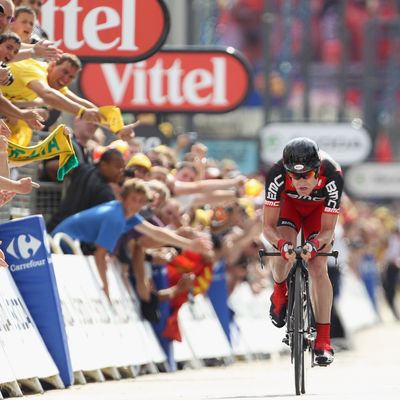
It was, as announcer Paul Sherman said, “a real ding-dong battle” to the end of today’s Stage 20 individual time trial that would decide who might win what has been the most exciting Tour de France in recent memory. And it was hard to know who to root for: Two-time second-place finisher Cadel Evans or two-time second-place finisher Andy Schleck. Evans would be the first-ever Australian winner of the Tour de France, and at 34 years old, the oldest winner since Henri Pélissier, who was 34.5 years old when he won in 1923. Then again, Evans had been so disappointingly conservative in the mountains — steady and strong but reactive rather than proactive. Schleck, on the other hand, is only 26, with many more Tours ahead of him. But he’d come so heartbreakingly close — 31 seconds behind Alberto Contador — the year before, and he’d been so thrilling and gutsy the last few days in the Alps, particularly in his crazypants attack 60 km from the end of Stage 18. Had he exhausted himself too soon? And can he ever overcome the Achilles’ heel that is his seemingly inherent inability to ride time trials well?
Perhaps the time trial played out just as it should have. At the start of the day, Schleck was in yellow, 57 seconds ahead of Evans. At the end of the day, he was way out of that jersey in second, having finished seventeenth, 2:31 behind Evans on the day and 1:34 behind him in the overall standings. His brother Frank finished just five seconds slower, and will ride into Paris in third place, 2:30 back overall, followed by amazing Thomas Voeckler in his highest TDF finish of his career, and Alberto Contador, who rode well today (finishing in third place, 59 seconds behind Evans), but who nonetheless looked like a shadow of his former self. Evans, on the other hand, rode the time trial of his life, finishing second, just seven seconds behind Tony Martin, a time trial specialist who’d also won on this same course in the Credit Dauphine. Not bad.
It was a thrilling end to a thrilling Tour, and we’re okay with how it all shook out. We wish Evans had been more explosive, and had really gone for it one day instead of playing it safe and strategic, but in the end, the smartest man won. It seemed so boneheaded of him not to chase down Andy Schleck in Stage 18, but that decision is likely what left him with enough energy to gain back the nearly full minute he needed to win today. And the Schleck brothers learned a valuable lesson (one that it seems they have to learn every year): If you’re going to suck at time trials — and chances are, with their body types, they’re never going to get exponentially better than they already are — you have to build an unassailable lead in the mountains. There’s no other way. If you look at Tour champions past (Lance Armstrong, Contador, Miguel Indurain, Greg Lemond), the formula is almost always the same: Kick ass in the mountains, kick ass at time trials, and don’t get hurt. And while Andy Schleck has amazing heart, he still hasn’t proved himself to be all-around great. All-around greatness is, ultimately, what the TDF measures, so if you lack so severely in one area, do you deserve to be crowned the very best? Evans deserved this win, and boy did he earn it. At least the Schlecks, and Voeckler, and Contador, kept things interesting. As announcer Phil Ligget says, “To have great champions, you have to have great losers.”